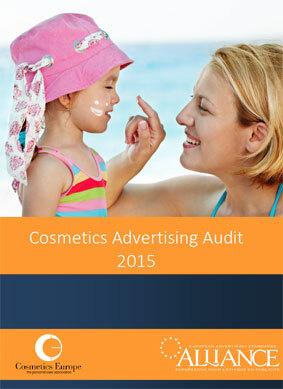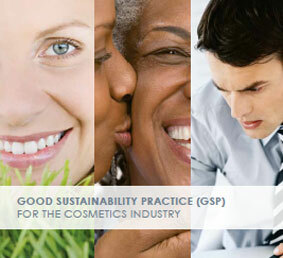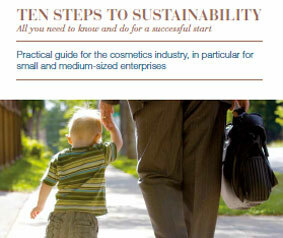The cosmetics and personal care industry places a major emphasis on proactive self-regulatory initiatives, in particular within the areas of advertising and sustainable development.
Responsible advertising
A strong legal framework, including both horizontal laws and the European Cosmetics Regulation as well as the Common Criteria Regulation, is in place in the EU to prevent misleading advertising.
To further protect consumers from misleading claims, the cosmetics industry developed the Charter and Guiding Principles on Responsible Advertising and Marketing Communications. They lay down the common ground for responsible advertising and marketing communications across Europe, via all media (print, tv/radio, internet), while complementing the existing comprehensive legislative framework.
The first version of the Charter was adopted in 2012 and it built on Cosmetics Europe’s long-term proactive work to promote best practice in cosmetics advertising undertaken in response to consumer concerns about potential adverse impacts that cosmetics advertising could have on individuals, as well as on society as a whole. In 2020, the Charter has been reviewed to better reflect the challenges of today’s highly digitalised world, in the context of fast-paced evolution of technologies and rapid development of new forms of digital advertising and marketing communication practices.
For further details on the Charter and Guiding Principles on Responsible Advertising and Marketing Communications, please click here.
Audit on industry self-regulation compliance
Working with the European Advertising Standards Alliance (EASA), an independent association that represents national self-regulatory organisations, Cosmetics Europe ran the largest ever pan-European audit of its kind in 2015.
The exercise aimed to check whether the current regulatory framework is effective when complemented with the self-regulation outlined in our charter and guiding principles.
A total of 1,861 advertisements were reviewed, including 577 television and 1,284 print advertisements aired or published over three single month periods: September 2014, March and June 2015.
Upon completion, the results demonstrate the efficiency of self-regulation, with 91% of advertisements considered as compliant with all relevant advertising codes and laws. Only 6% of advertisements were considered to be in breach of the relevant advertising codes and laws while 3% were considered as ‘in doubt’. Despite the positive outcome, Cosmetics Europe remains committed to further improving compliance by promoting both regulatory and self-regulatory frameworks and working with stakeholders like EASA and national self-regulatory bodies.
View the full results of the EASA audit.
Sustainable development
Our industry is committed to sustainable development in order to help to protect the human and environmental resources we utilise and affect. In line with the United Nations, we define sustainable development as meeting the needs of the present without compromising the ability of future generations to meet their own needs, based on three pillars: economic development, environmental protection and social responsibility.
Cosmetics Europe promotes sustainable development by providing guidance to our members on voluntary measures to improve sustainability practices. We have developed documents for members including ‘Good Sustainability Practice for the Cosmetics Industry’, which provides practical advice on developing an effective sustainability strategy and ‘Ten Steps to Sustainability: all you need to know and do for a successful start’, which assists companies (particularly SMEs) that are commencing their sustainability efforts.
Cosmetics Europe also developed specific guidelines for complying with the EU ABS Regulation (No 511/2014) relating to genetic resources, and the equitable sharing of benefits derived from their use. Cosmetics Europe worked with stakeholders from across the cosmetics value chain, specifically two European associations representing cosmetic ingredient suppliers EFfCI and UNITIS, to produce a comprehensive guidance package for the industry. The package aims to help companies and associations in the cosmetics sector understand the requirements of the EU ABS Regulation and to provide practical guidance, wherever possible.
Voluntary action on specific ingredients
PFAS
In October 2023, Cosmetics Europe recommended cosmetics manufacturers to phase out the use of per- and polyfluoralkyl ingredients (PFAS), if intentionally added to cosmetic products, placed on the market in EU EEA and UK, by December 31st 2025. This recommendation is consistent with the strategy of the European Commission, who in their Chemical Strategy for Sustainability is reviewing the use of PFAS across all industry sectors, including cosmetics products, with the aim to phase out use. Read the full text of the recommendation.
Microplastics
The occurrence of plastic debris in the marine environment is an issue of increasing public concern. The vast majority of small plastic particles have been shown to come from the breakdown of bigger plastic materials.
In 2015, Cosmetics Europe published a specific recommendation for companies to discontinue, in wash-off cosmetic products placed on the market as of 2020: the use of synthetic, solid plastic particles used for exfoliating and cleansing that are non-biodegradable in the marine environment. This recommendation built on voluntary initiatives already taken by individual member companies of Cosmetics Europe. This action was taken despite the cosmetics and personal care products sector being considered as a minor potential contributor to the total amount of the aquatic plastic litter.
On 27 January 2017, Cosmetics Europe announced the results of a survey showing an 82% reduction in use of plastic microbeads.
All the answers to the questions you might want to ask about the Cosmetics Europe survey on plastic microbeads used in wash-off products can be found here, in the FAQ section.
In 2018, the strength and effectiveness of the Cosmetics Europe recommendation and the industry voluntary action were re-confirmed. New data gathered by Cosmetics Europe in 2018 shows that 97.6% of plastic microbeads used for exfoliating and cleansing purposes in wash-off cosmetic and personal care products were phased out between 2012 and 2017.
The press release announcing the 97.6% decrease can be found here along with the detailed FAQs on the data collection.
Read more about plastic microbeads here.
Methylisothiazolinone (MIT)
In the interests of consumer health and in response to new clinical data, market feedback and Quantitative Risk Assessment analysis that shows an increase in adverse skin reactions, Cosmetics Europe published an industry-wide recommendation to discontinue the use of the preservative MIT in leave-on skin cosmetics and personal care products. Cosmetics Europe recommended that industry should not await regulatory intervention, but rather, take voluntary action to implement this change, although the European Commission later adopted the same recommendation. Read the full text of the recommendation.
Sunscreens
The cosmetics and personal care industry, with the European Commission, has published a recommendation on the efficacy of sunscreen products and the claims made for them.
It is important that sunscreens protect against both UVB and UVA radiation. The Commission’s recommendation notes that the UVA protection of a product should be in relation to its SPF and that this should be at least 1/3 ratio of its SPF. European industry best practice is to indicate UVA protection in this respect on the pack by the letters ‘UVA’ in a circle.



